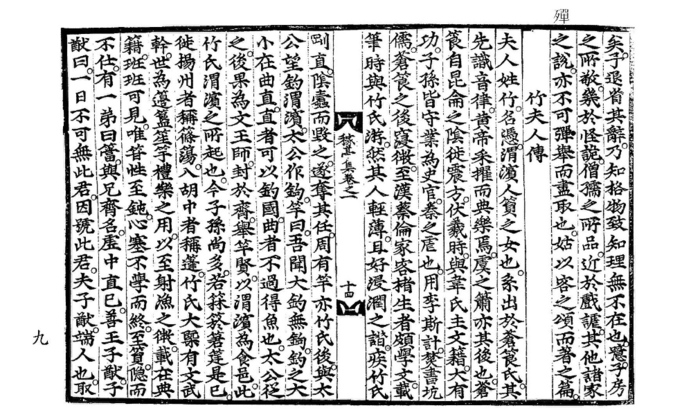(Translation) 竹夫人傳
| Primary Source | ||
|---|---|---|
 |
Title | |
| English | Chuk puin chŏn (Biography of Lady Bamboo) | |
| Chinese | 竹夫人傳 | |
| Korean(RR) | 죽부인전 | |
| Text Details | ||
| Genre | ||
| Type | ||
| Author(s) | 이곡 李穀 (稼亭集 1卷) | |
| Year | ||
| Source | ||
| Key Concepts | ||
| Translation Info | ||
| Translator(s) | Participants of 2018 Hanmun Summer Workshop (Intermediate Training Group) | |
| Editor(s) | Svakova Petra | |
| Year | 2018 | |
Introduction
Original Script
| Classical Chinese | English |
|---|---|
|
(原文) 竹夫人傳 夫人姓竹。名憑。渭濱人篔之女也。系出於蒼筤氏。其先識音律。黃帝采擢而典樂焉。虞之簫亦其後也。蒼筤自昆侖之陰徙震方。伏羲時。與韋氏主文籍。大有功。子孫皆守業爲史官。秦之虐也。用李斯計。焚書坑儒。蒼筤之後䆮微。至漢蔡倫家客楮生者頗學文。載筆時與竹氏游。然其人輕薄。且好浸潤之譖。疾竹氏a003_107d剛直。陰蠧而毀之。遂奪其任。周有竿亦竹氏後。與太公望釣渭濱。太公作鉤。竿曰。吾聞大釣無鉤。釣之大小在曲直。直者可以釣國。曲者不過得魚也。太公從之。後果爲文王師。封於齊。擧竿賢。以渭濱爲食邑。此竹氏渭濱之所起也。今子孫尙多。若箖箊䇹筳是已。徙楊州者稱篠簜。入胡中者稱篷。竹氏大槩有文武幹。世爲籩簋笙竽禮樂之用。以至射漁之微。載在典籍。班班可見。唯䇞性至鈍。心塞不學而終。至篔。隱而不仕。有一弟曰簹。與兄齊名。虗中直己。善王子猷。子猷曰。一日不可無此君。因號此君。夫子猷。端人也。取a003_108a友必端。則其人可知。娶益母女。生一女。夫人是也。緫角有貞淑姿。隣有宜男者作淫詞挑之。夫人怒曰。男女雖殊。其抱節一也。一爲人所折。豈可復立於世。宜生慚而去。豈牽牛子之輩所可覬覦也。旣長。松大夫以禮聘之。父母曰。松公君子人也。其雅操與吾家相侔。遂妻之。夫人性日益堅厚。或臨事分辨。捷疾若迎刃而解。雖以梅仙之有信。李氏之無言。曾且不顧。而况橘老杏子乎。或値烟朝月夕。吟風嘯雨。蕭洒態度。無得而狀。好事者竊寫其眞。傳之爲寶。若文與可,蘇子瞻尤好焉。松公長夫人十八歲。晚學仙。遊穀城山。a003_108b石化不返。夫人獨居。往往歌衛風。其心搖搖。不能自持。然性好飮。史失其年。五月十三日。移家靑盆山。因醉得枯渴之疾。遂不理。自得疾依人而居。晚節益堅。爲鄕里所推。三邦節度使惟箘與夫人同姓。以行狀聞。贈節婦。 史氏曰。竹氏之先。有大功于上世。其苗裔皆有材抗節。見稱於世。夫人之賢宜矣。噫。旣配君子。爲人所倚。而卒無嗣。天道無知。豈虗語哉。 |
The wife's family name was Juk1. and her name was Bing2. She was a daughter of Un3 from Wibin but her ancestral lineage came from the clan of Changnang4. Un's ancestor knew the principles of tones [so] the emperor chose him (the ancestor) for an official post in which he was in charge of the music and even So5 from the times of the emperor Shuhn6 was his descendant. [The clan] of Changnang moved on their own from the north side of the Gunlan mountain to the region of thunders7. During the times of Fu Xi8, together with the clan of Wi9 they supervised books and did great accomplishment [for the country]. All of the descendants guarded the profession and became court historians. Under the tyranny of Qin [Shi Huang10], Li Si11's plan was used, books were burned, Confucianists were buried alive in ravine12, and the descendants of the clan of Changnang gradually declined. [Then when the time] reached to the Han dynasty, a person [called] Chu Sheng who was Cai Lun13's house guest learned a lot [about] writing, he carried [his] writing brush and from time to time hanged out with [people of] Juk family. However, that person was frivolous and moreover he liked slanders that gradually soaked into the minds, detested Juk family's uprightness, talked behind [the family members'] backs and in the end, he usurped the [family's] post [for himself]. Gan14 who lived in the state of Zhou was also a descendant of the Juk family. Together with Tai Gong Wang15, he was fishing on the Wei river bank [and while] Tai Gong was making a hook Gan said: "I heard that you [can] fish greatly without a hook. [It depends on whether ] it is big or small, crooked or straight. [Only] the one [who can fish without a hook] can obtain the country in the right way, the one [who fish with] the hook cannot obtain more than a fish." Tai Gong followed that. Later Tai Gong actually became king Wen16's teacher and was invested with the principality of the state of Qi. He recommended Gan as a wise man and the Wei river bank17 became a fief town. This is the place where the Juk family came from. Even nowadays many of [their] descendants [live there] and these are like [the families of] Lin, Yu, Jun and Ting. 1 竹 means 'bamboo'. 2 憑 means 'to support'. 3 篔 means 'tall bamboo'. 4 渭濱 means 'green young bamboo'. 5 簫 means 'flute', 'ancient panpines'. 6 2255-2205 B.C. 7 震方 also means the Eastern region. 8 one of the earliest legendary emperors (2852-2738 B.C.), reputed to invent writing. 9 韋 means 'leather string to join bamboo poles'. 10 the first emperor of Qin (259 - 210 B.C.). 11 Chinese politician (280 - 208 B.C.). 12 213 - 212 B.C. 13 Chinese inventor and politician, known for the invention of paper and the papermaking process (48 - 121). 14 竿 means 'bamboo stem' or 'fishing rod'. 15 also known as Jiang Ziya was a Chinese noble who helped king Wen and Wu of Zhou overthrow the Shang (11th century BC). 16 King Wen of Zhou (1152 - 1056 BC). 17 also Wibin. ) |
- Discussion Questions:
Footnotes
